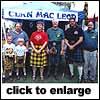
 A Scots Gaelic Primer - Part One
A Scots Gaelic Primer - Part OneBy Jeff MacLeod Ramsden, FSA (Scot) Regional Vice President Clan MacLeod Society There has been an incredible resurgence of interest in the language of our ancestors in recent times. Thankfully, many people around the world are once again learning the ancient language of the Gael. And for those of you that have tried it, it's not easy, is it? What makes Scots Gaelic (Gàidhlig - pronounced "Gah-lick") so difficult to learn is that there are few people that speak it fluently outside of the Highlands and Islands of Scotland (which makes practicing difficult), coupled with the fact that it just doesn't sound like it looks to a native English speaker. Hopefully, I can help with some of that in this series. Before we begin, I'd like to take a moment to thank Deborah White of Distant Oaks for her assistance with this series. Deborah teaches Irish Gaelic (Gaeilge) and Gàidhlig in the San Francisco bay area of California, USA, and provided lots of help, contributions, and corrections. There really isn't any substitute for having a living, breathing teacher ... If you'd like formal instruction, please let me know and I'll be happy to help you find a teacher in your area. Deborah has an excellent and active mailing list, write her at gaidheal@distantoaks.com for information on joining. It's a great way to practice your reading and writing. Now for the messy (but fun!) stuff. Before we get started with phrases, there are a few rules to keep in mind. In Gàidhlig, the verb comes first....a bit like you're asking a question all the time. For example:
It sounds a bit strange at first, but you will get
used to it in no time at all.
The next thing is that Gàidhlig, like most
languages (but not English) uses the concept of the formal and informal
"you." That is, if you don't know someone very well, and unless
they ask you to address them familiar, you should use the formal speech.
Think of it this way - anyone you would address as "Mr.",
"Mrs.", "Ms.", "Dr.", etc, use the formal.
There is also the concept of "masculine" and
"feminine" nouns, but we won't get into those quite yet.
The Gàidhlig word for "is, am, are" is
written "tha" (and pronounced "ha"). Now that we have
the cornerstone, we can add the mortar:
Okay, now we'll add a few adjectives, so that we can start making sentences.
Watch:
See? It's really not so difficult when you break it up into little pieces. Now we'll double our knowledge with the negative form. Remember that "tha" is the word for "is/are/am?" Well, the converse is written "chan eil", pronounced "chayn yale" - the "ch" being pronounced like the end of "loch." Here we go!
See? Look how many sentences you've learned already! And we just doubled it by adding two words to your arsenal! Now for our finale for this installment. Here are two phrases that you will hear around Gàidhlig speakers fairly often. They are amazingly useful, and two of the first things you will learn in most any language - "How are you?" and the usual response - "I am fine."
Try practicing these with your friends and family. You'll be surprised how fast it sinks in. In our next installment, we'll get into more complex vocabulary as well as the concepts of masculine and feminine nouns. Don't worry....just a little bit of practise and you'll soon be speaking the Gàidhlig! Slan, mar sin leibh an dràsda
This article previously appeared in the
For information on the Clan MacLeod (Pacific Region) and its activities, send an E-Mail to info@macleodpacific.org |
Thursday, December 26th, 2019
Attention visitors: Tartans.com is back. Please note that this is a snapshot of the site as it existed nearly 20 years ago and you may encounter broken links; we are still combing through the site and correcting those as we find them. Please also note that some sections are currently not functional, primarily the discussion forums/clan chat boards.
|
** HOME - First Time Visitors - Glossary - - Contact Us ** Awards | Bibliography | Clan Calendar | Clan Chat | Clan Finder | History | Famous Scots | Genealogy | Great Hall of the Clans | Links | News and Features | Scots on the Net | Search | Site Map The Gathering of the Clans
Copyright 1995- Tartans.com - All Rights Reserved. |

